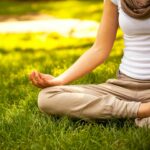Search results for: weekly practice
Episode 137 :: Stephen Schettini :: Secular Practice One-On-One
Stephen Schettini The Naked Monk Stephen Schettini joins us to speak about personal evolution from religious Buddhism to secular practice. It’s interesting, isn’t it, how things change and yet so much remains the same? We have in our world, for example, not only ongoing lineages of religious Buddhism, but these traditions are growing alongside new…
Read MoreThe Practice of Buddhist Meditation is Not for the Fainthearted
We’re hearing about studies that boast meditation reduces stress, lowers high blood pressure, and calms the mind. These all sound great, and perhaps over the course of time, meditation has that effect, but that is not the purpose of Buddhist meditation. In fact, if your meditations are relaxing and cozy, I’m going to be bold…
Read MoreWhat Is Secular Buddhist Practice?
We often get asked by traditional Buddhist, and people of all kinds, what is secular Buddhist practice? This is a great question, and I’ll do my best to answer, but I hope other secular Buddhist practitioners will also comment on this article to share any practices not mentioned here. Also, I want to remind everyone that we have a discussion forum that is dedicated to secular Buddhist practice, where people can ask questions and share their practice.
What is secular Buddhist practice? For the most part, secular Buddhist practice is identical to traditional Buddhist practice. In every Buddhist tradition to my knowledge, the following are vital practices:
Read MoreStarting Out
THIS PAGE IS UNDER REVISION. Narrative by Ted Meissner. Whether you are new to Buddhism or you are coming from one of the other Forms of Buddhism, we hope this area of the site helps you get started in your practice, and that the rest of the site continues to be a source of useful…
Read MoreWhat are the Three Marks of Existence?
The Three Marks of Existence is important in Buddhism, because it means we start to see things, situations as they really are. Everything is impermanent, suffering is a part of existence (for living things anyway), and nothing exists in and of itself, without dependencies. The three marks of existence is not an idea or theory…
Read MoreBody Meditation
Buddha directed people to contemplating the body frequently, and for good reasons. Meditating on the body: Helps get you out of your head Reminds us of our physical nature and characteristics Provides several points to settle busy minds Shows us the direct experience of impermanence and not self For the next couple of weeks,…
Read MoreStaying in the Body and Out of the Mind
We’ve all been there. An argument with a relative erupts, and on your drive home you relive the experience repeatedly, so when you arrive, you realize you weren’t aware of most of the drive. For the rest of the night, you replay that argument mentally, say the things you wish you’d thought of then, and…
Read MoreIf Not-Self Then What?
The Buddha’s teachings on not-self truly are impressive, especially when you consider those were times in which people were immersed in beliefs about the supernatural, an essence of self that is everlasting, and a multitude of gods. For Buddha to point out the parts of the body as not self, the emotions as not self,…
Read MoreEpisode 108 :: George Haas :: Morning Meditation, Online
George Haas speaks with us today about his call-in mentoring program, Morning Meditation, and the benefits of having a teacher.
Read MoreEpisode 102 :: Martine Batchelor :: Let Go: A Buddhist Guide to Breaking Free of Habits
Martine Batchelor speaks with us about her book, Let Go: A Buddhist Guide to Breaking Free of Habits.
Habits. We all have them, most insidiously if we aren’t even aware of them. Fortunately, we’re not stuck with habits, and every moment is an opportunity to have a new and fresh beginning at redirecting our minds, so we can break that cycle of habit formation and continuation.
Read More
